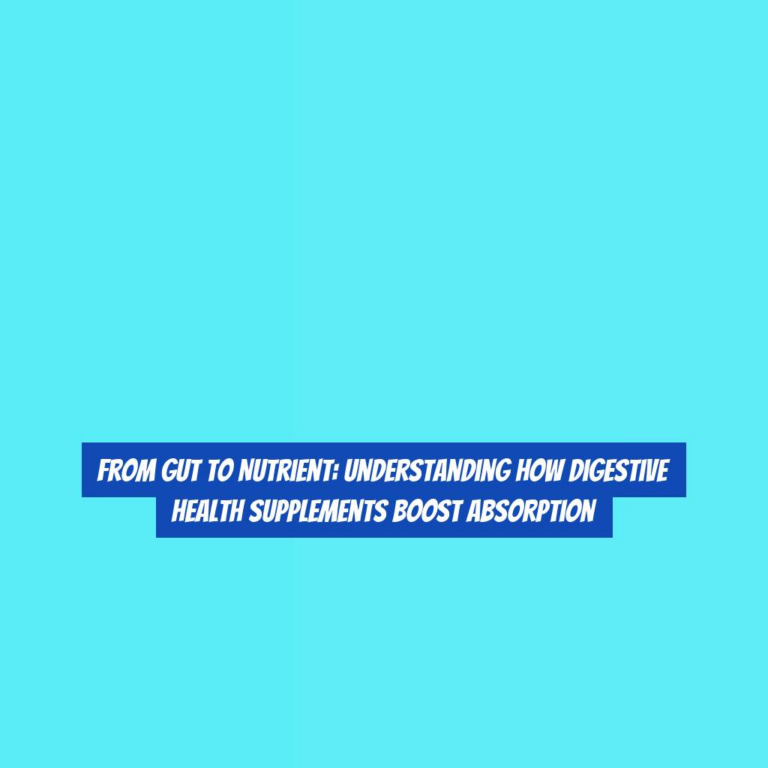Unlocking Nutritional Potential: Understanding the Science of Nutrient Absorption
YouG??ve probably heard the saying, G??You are what you eat.G?? But have you ever wondered how much of what you eat actually gets absorbed by your body? Understanding the science of nutrient absorption is key to unlocking the full potential of the food you consume.
From the role of digestive enzymes to the factors affecting bioavailability, thereG??s a complex interplay of processes at work. But what if you could optimize your nutrient absorption strategies to ensure that your body gets the most out of every bite?
You might be surprised at what you could achieve.
The Basics of Nutrient Absorption
To properly understand the basics of nutrient absorption, you must first comprehend the mechanisms at play within the human body.
When you consume food, the process of digestion begins in the mouth as enzymes start breaking down the food. As the food moves through the digestive system, it encounters stomach acid and various digestive enzymes that further break it down into its nutrient components.
The small intestine is where the majority of nutrient absorption occurs. ItG??s lined with small finger-like projections called villi, which increase the surface area for nutrient absorption. These villi contain specialized cells that transport nutrients into the bloodstream.
Once in the bloodstream, nutrients are transported to different parts of the body to support various functions, such as energy production, tissue repair, and growth.
Understanding the basics of nutrient absorption is crucial because it allows you to make informed choices about your diet and ensure that your body receives the essential nutrients it needs to function optimally.
Factors Affecting Nutrient Bioavailability
As you grasp the basics of nutrient absorption, it becomes evident that various factors significantly impact the bioavailability of these essential nutrients within the human body. Understanding these factors is crucial for optimizing your nutritional intake.
Here are the key factors affecting nutrient bioavailability:
-
Nutrient-Nutrient Interactions: Some nutrients can enhance or inhibit the absorption of others. For example, vitamin C can enhance the absorption of non-heme iron, while calcium can inhibit its absorption.
-
Food Processing and Preparation: The way food is processed and cooked can affect nutrient bioavailability. For instance, boiling vegetables can leach out water-soluble vitamins, reducing their availability.
-
Gut Health and Digestive Disorders: The health of your gastrointestinal tract plays a significant role in nutrient absorption. Digestive disorders such as celiac disease or CrohnG??s disease can impair nutrient absorption.
-
Age and Life Stage: Nutrient bioavailability can vary with age and life stage. For instance, the ability to absorb vitamin B12 may decrease with age, leading to potential deficiencies in older adults.
Being mindful of these factors can help you make informed dietary choices to maximize the bioavailability of essential nutrients.
The Role of Digestive Enzymes
Understanding how digestive enzymes work is essential for optimizing the digestion and absorption of nutrients in your body. Digestive enzymes play a crucial role in breaking down the food you eat into smaller, more easily absorbable components. For example, amylase helps break down carbohydrates, protease aids in the digestion of proteins, and lipase assists in breaking down fats. These enzymes are produced by your body, primarily in the pancreas, and are also found in certain foods and supplements.
When your body doesnG??t produce enough digestive enzymes, it can lead to digestive discomfort and nutrient malabsorption. This can be particularly problematic for individuals with conditions such as pancreatic insufficiency or cystic fibrosis. By understanding the role of digestive enzymes, you can make informed decisions about your diet and potentially incorporate enzyme-rich foods or supplements to support your digestive system.
Additionally, factors such as age, stress, and certain medical conditions can impact the bodyG??s natural enzyme production, making it important to be mindful of your individual digestive needs. Optimizing the function of digestive enzymes can enhance nutrient absorption and overall digestive health.
Understanding Micronutrient Transport
Optimizing the function of digestive enzymes enhances the breakdown and absorption of nutrients, including essential micronutrients that are crucial for overall health and well-being. Understanding how micronutrients are transported within the body is essential for ensuring that they reach their intended destinations and fulfill their vital roles.
HereG??s what you need to know:
-
Carrier Proteins: Specialized proteins act as carriers, shuttling micronutrients across cell membranes to facilitate their absorption into the bloodstream.
-
Active Transport: Some micronutrients require energy to be transported across cell membranes against a concentration gradient, a process known as active transport.
-
Facilitated Diffusion: Certain micronutrients rely on facilitative diffusion, using specific transport proteins to move across cell membranes along a concentration gradient.
-
Chelation: Micronutrients such as iron and zinc can form complexes with organic molecules, aiding in their transport and absorption within the body.
Understanding the intricate processes involved in micronutrient transport can help you make informed choices to ensure optimal nutrient absorption and support your overall well-being.
Optimizing Nutrient Absorption Strategies
Enhancing your dietary habits can significantly improve the absorption of essential nutrients, supporting your overall health and well-being. To optimize nutrient absorption, itG??s crucial to focus on a diverse and balanced diet. Include a variety of fruits, vegetables, whole grains, lean proteins, and healthy fats in your meals to ensure youG??re getting a wide array of essential nutrients.
Additionally, consider the timing of your meals. Eating smaller, more frequent meals throughout the day can help enhance nutrient absorption compared to consuming large meals infrequently. Pairing certain foods together can also enhance nutrient absorption. For example, consuming vitamin C-rich foods with iron-rich foods can improve the absorption of iron.
Furthermore, cooking methods can impact nutrient absorption. Steaming and saut+?ing vegetables can help retain more nutrients compared to boiling. Lastly, maintaining a healthy gut is essential for optimal nutrient absorption. Consuming probiotic-rich foods or taking probiotic supplements can support a healthy gut microbiome, aiding in the absorption of nutrients.
Conclusion
Now that you understand the science of nutrient absorption, you can make informed choices to optimize your nutritional intake.
By considering factors like bioavailability, digestive enzymes, and micronutrient transport, you can unlock the full potential of the nutrients you consume.
Incorporating these strategies into your diet can help ensure that your body is able to effectively absorb and utilize essential vitamins and minerals for optimal health and well-being.




